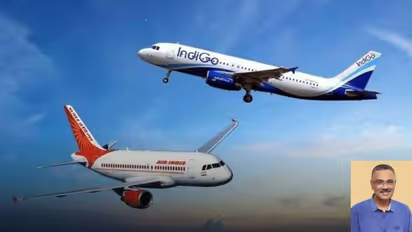IndiGo vs Air India: Battle for dominance in India's aviation market

Synopsis
Indian aviation industry is entering a period of significant growth and change, with major investments and strategic moves being made by some of the country's largest airlines, says Girish Linganna.
India's aviation industry is set for a major shakeup following Air India's multi-billion-dollar deal to purchase 250 planes from Airbus. The move has put pressure on other airlines in the market to invest in their own fleets and expand their operations, with IndiGo, India's largest airline, reportedly considering an order for up to 500 planes of its own.
The potential order would be a significant undertaking for IndiGo, which already has plans to add 150 Airbus A320neo aircraft to its fleet by 2025. However, the airline is known for its ambitious growth plans and has a strong track record of expanding its operations.
India's 'deepwater' story: How Modi govt's push for offshore exploration has appealed energy giants
The order is expected to be split between Airbus and Boeing, with IndiGo reportedly in talks with both manufacturers. The airline is said to be interested in a range of models, including the A320neo and A321neo from Airbus and the 737 MAX from Boeing.
The move by IndiGo is seen as a response to the competitive threat posed by Air India's purchase of new planes, as well as an attempt to secure its position as the dominant airline in the Indian market. With Air India set to take delivery of 250 new planes, the move is expected to shake up the market and put pressure on other airlines to invest in their own fleets and expand their operations.
The potential order for 500 planes is a reflection of IndiGo's confidence in the long-term growth potential of the Indian aviation market. Despite the ongoing challenges facing the industry due to the COVID-19 pandemic, the airline remains optimistic about its future prospects.
Signs of Confidence: Bold Step Amidst COVID-19 Challenges
Some analysts have raised concerns about the potential risks of such a large investment, particularly in light of the ongoing challenges facing the aviation industry due to the COVID-19 pandemic. The pandemic has had a severe impact on the industry, with airlines around the world forced to ground their fleets and cancel thousands of flights due to travel restrictions and reduced demand for air travel.
While the situation is beginning to improve, with many countries easing travel restrictions and vaccination rates increasing, the industry is still facing significant challenges. Many airlines are still struggling to recover from the financial impact of the pandemic and are being forced to take on additional debt in order to stay afloat.
Despite these challenges, IndiGo's management team remains optimistic about the airline's future prospects. In a recent interview, the CEO of IndiGo said that the potential order for 500 planes was a reflection of the company's "confidence in the long-term growth potential of the Indian aviation market."
The move by IndiGo is also expected to have a major impact on the Indian aviation industry as a whole. With the country's economy beginning to recover and demand air travel expected to increase, the Air India-Airbus deal and the potential indigo order are seen as signs of confidence in the sector's future.
Despite these concerns, the Indian aviation industry is entering a period of significant growth and change, with major investments and strategic moves being made by some of the country's largest airlines. As the industry continues to evolve and adapt to the changing market conditions, it will be interesting to see how it develops and what impact these developments will have on the wider economy.
The author is a defence and aerospace analyst
Out on bail, social media influencer wants cricketer Prithvi Shaw booked for molestation
Stay updated with all the latest Business News, including market trends, Share Market News, stock updates, taxation, IPOs, banking, finance, real estate, savings, and investments. Track daily Gold Price changes, updates on DA Hike, and the latest developments on the 8th Pay Commission. Get in-depth analysis, expert opinions, and real-time updates to make informed financial decisions. Download the Asianet News Official App from the Android Play Store and iPhone App Store to stay ahead in business.